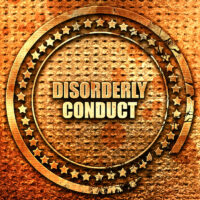What Constitutes Disorderly Conduct in California?

Disorderly conduct, also known as “disturbing the peace,” is a crime under California penal code section 647. Disorderly conduct generally involves public activity or behavior that is offensive or disruptive, such that it prevents others from enjoying a public space. In California, disorderly conduct also includes prostitution. It is a misdemeanor punishable by up to six months in jail and a $1,000 fine. The general definition of disorderly conduct is somewhat nebulous in many states, but California law enumerates specific types of disorderly conduct which serve to elucidate the boundaries of the crime. Continue reading for a discussion of disorderly conduct in California, and contact a seasoned Ventura criminal defense attorney if you have been arrested or charged with a crime in Southern California.
Examples of disorderly conduct
Disorderly conduct generally involves disruptive or offensive behavior that interferes with other people’s enjoyment of public spaces. PC 647 lays out specific examples of disorderly conduct, including:
- Soliciting others to engage in or personally engaging in “lewd or dissolute conduct” in public or exposed to public views;
- Soliciting or engaging in acts of prostitution;
- Accosting other people in a public place for the “purpose of begging or soliciting alms,” i.e., aggressive panhandling;
- Lodging in a building or vehicle without the permission of the owner or person in possession (“squatting”);
- Loitering in a public bathroom for the purpose of soliciting sex acts;
- Loitering or prowling on someone else’s property;
- Loitering or prowling on someone else’s property and peeking into their window;
- Public intoxication, to the point of being “unable to exercise care for his or her own safety or the safety of others” or obstructing other’s use of any public street, sidewalk, or public way;
- Peeping into someone else’s private space, recording someone else in a private space, or taking invasive, private photos without permission.
Certain other crimes that are not enumerated under this section are treated similarly to disorderly conduct. For example, participating in a riot (using or threatening unlawful force in a public place), disturbing the peace, and refusing to disperse when lawfully ordered to do so are generally treated like disorderly conduct.
Help After an Arrest in Ventura County
If you have been arrested for disorderly conduct or are otherwise facing criminal charges in southern California, get serious, experienced, dedicated legal help by contacting the Ventura offices of Paul Tyler for a free consultation at 805-889-9000.



